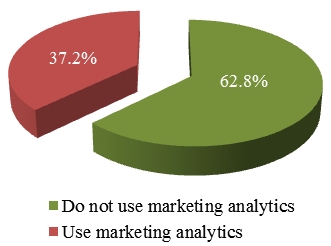Last year, Forbes published an article on marketing analytics called “Using Marketing Analytics: I Do, Therefore, I Think.” Statistics from a February 2012 CMO Survey found that organizations intended to increase the marketing analytics portion of their marketing budget from 5.7%, on average, to 9.1%. However, when asked how much available or requested marketing analytics were actively leveraged in ongoing decisions, 63% of the time managers were not using analytics at all. So, what can CMOs and marketing leaders do to increase the value and effectiveness of marketing analytics?

Author Christine Moorman highlighted three ways organizations typically use marketing intelligence: evaluative use, instrumental use, and conceptual use:
- Evaluative use is the most commonly leveraged tactic which is applied to evaluate marketing actions. This is where companies spend most of their time on analytics asking “How did we do?” or “What was our ROI on the investment.”
- Instrumental use of analytics helps develop or implement a strategy. This the second most common area managers will use to shape and define execution strategies.
- Conceptual use is perhaps the most profound, yet most difficult to measure. Conceptual analytics affects managers’ beliefs, knowledge or the mind-sets they bring to their work.
Adapting Conceptual Analytics to Conversational Marketing
Given the fact that traditional marketing analytics are largely focused on evaluating the success of campaigns, one can’t help but wonder what it would take to change or alter the success of conversational marketing efforts? Conversational marketing builds a one-to-one dialogue with customers to maximize the lifetime value of the relationship. In this context, it’s not about measuring the success of a single sale, but rather building lasting relationships that maximize sales over a lifetime. But the ultimate measure of success isn’t always ROI and revenue when evaluating the effectiveness of conversational marketing efforts.
For this reason, conceptual analytics may actually play a critical role in optimizing conversational marketing. Here’s how.
If marketers focus analytical efforts on non-sales and ROI related metrics, they may actually be capable of influencing their beliefs about the value of marketing investments relative to all stages of the customer lifecycle, not just the final purchase. For example, if analytics examine the effect of Net Promoter Score (NPS) or loyalty, over time marketers will be more likely to design campaigns that alter the effects on these metrics as well. Conceptual marketing results can have a longer and more profound impact on conversational marketing strategy because they impact beliefs in general.
In the context of conversational marketing, marketers should slightly shift focus away from attribution alone and evaluate how marketing strategy is impacting customer dialogues and world-class customer experiences. The conceptual application of analytics would seek answers around customer behavior and reactions to campaigns.
- Does this message elicit a response via core inbound channels?
- How are competitive messages perceived?
- Does the campaign accelerate the speed at which prospects educate themselves about the benefits of our solution or service?
Answers to these types of questions could have a long-term impact on marketers’ beliefs about engaging in more intimate dialogues with customers and therefore may actually prove to be significant levers in campaign results.
Evaluative analytics such as ROI and sales remain critical measures of success, but conceptual analytics could actually offer a long term means of actually turning up the dial on marketing return.
